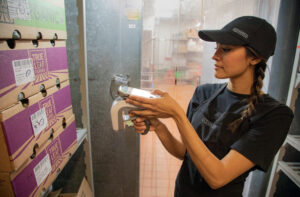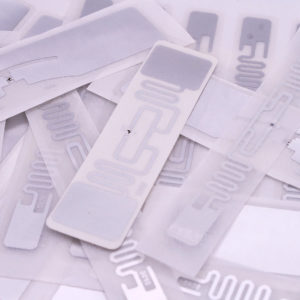RFID Tracks Food Ingredients, Chipotle Chipotle Mexican Grill is piloting a radio frequency identification solution. Designed to help the company track ingredients through its distribution centers and about 200 restaurants in the Chicago area. By attaching UHF RFID tags to the ingredient bins and upon receipt of these tags. By reading these tags with hand-held readers. Restaurants are able to capture and manage data about supplies. And ensure food safety and operational efficiency at each site.
Chipotle is one of the first major restaurant companies to test RFID technology to improve traceability and food safety, according to the technology provider. The fast food chain operates in the United States, United Kingdom, Canada, Germany and France. With a total of about 3,000 restaurants. It specializes in tacos, salads, bowls and burritos, made on the spot. As such, Chipotle takes the fresh ingredients used in its products very seriously.

RFID Tracks
Chipotle Uses RFID
Chipotle is testing radio frequency identification technology to enhance its traceability and inventory systems.
According to Chipotle, the goal is to test a technology-based system to track fresh ingredients. And the company chose to start testing RFID in 2020. “RFID technology is the best way to transmit serialized food items received by restaurants.” Said Thomas Burke, Chipotle’s FSQA Traceability Manager.
During the pilot, the company has applied passive UHF RFID tags, supplied by Avery Dennison Smartrac. To ingredient bins used to prepare Chipotle foods. Five of Chipotle’s suppliers are labeling crates full of meat and dairy products and avocados for a pilot. Each label is encoded with a unique ID number. That is associated in the backend software with data about the product in the box.
Once a Chicago-area restaurant receives an item, employees use their handheld RFID readers to confirm receipt and when. And the software updates the item’s status. This information helps restaurant and business managers ensure existing inventory at each site and determine the freshness of each product.
Supply Chain Visibility
In the long run, such a system could provide a complete history of the movement of goods through the supply chain, Burke said. “By giving each case a globally unique identification and being received by the restaurant.” He explained, “we can build systems around when a product is first received.” A digital record of the history of each product throughout the supply chain. As well as its usage in restaurants, data can be provided for real-time purposes as well as historical or analytical purposes.
 Thomas Burke
Thomas Burke
According to Burke, the technology “creates an avenue for continuous monitoring of product locations within Chipotle restaurants.” While the technology pilot began on March 28. The company intends to evaluate the results as it progresses before deciding whether to roll out a nationwide rollout. promotion.
During the Pilot
Chipotle has partnered with Avery Dennison, RFID software company Mojix, and Zebra Technologies. Zebra offers handheld RFID readers. While Mojix offers its ytem software-as-a-service (SaaS) solution to manage read data and integrate with Chipotle’s existing in-house software. Mojix also provides a front-end application layer that manages store-level campaigns.
In addition to leveraging external RFID software, Chipotle also performs some internal data management, Burke said. “Developing reports and validating data are some of the activities that Chipotle handles internally,” he said.
Reduce Labor and Improve Food Safety
If the pilot goes as planned, Burke said, “we expect the program will improve product information data fidelity for inventory, food safety, and supply chain use cases.” Beyond that, he hopes to determine whether the system can save previous manual recordings Time for employees who receive product information. In this way, he said, “the pilot program will also save labor.” In addition, he adds, “Chipotle sees RFID-tagged ingredient serialization as a tool to reduce friction in restaurants and improve the employee experience.”
Operations staff and corporate restaurant support centers can leverage the technology to access inventory data in real-time, reducing human error. “Accurately managing shelf life means better food safety,” said an unnamed Mojix spokesperson, “but also reduces food waste, which is good for the environment and the company’s bottom line.”
Key Point
Chipotle is leading the restaurant chain to improve efficiency and food safety through RFID while reducing waste.
A pilot currently underway will test whether the technology can ensure fresh produce is used when fresh, and whether it can automatically manage inventory, saving labor.













